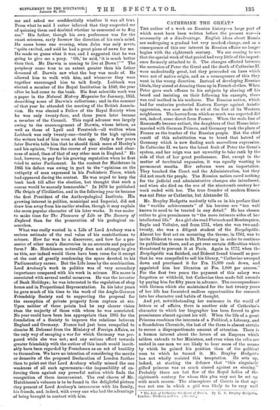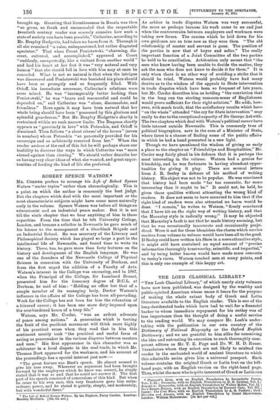CATHERINE THE GEEAT.
THE author of a work on Russian history—a large part of which must have been written before the present war--4s necessarily at a disadvantage. English ideas about Russia are undergoing a gradual but very marked change, and as a consequence of this our interest in Russian affairs no longer begins with the eighteenth century. We are coming to see that the special work of that period had very little of the import- ance formerly attached to it. The changes effected between the accession of Peter the Great and the death of Catherine IT. were undoubtedly great, but they proceeded on lines which were not of native origin, and as a consequence of this they went in the wrong direction. Instead of developing Russian ideals, they aimed at dressing them up in French clothes. When Peter gave such offence to his subjects by shaving off his beard and insisting on their following his example, there was real method in his madness. The Russian nation, which had for centuries protected Eastern Europe against Asiatic aggression, was now made to sit at the feet of its Western neighbours. The leaven from which so much was expected did not, indeed, come direct from France. When the male line of Romanoffs became extinct, the daughters of that House inter- married with German Princes, and Germany took the place of France as the teacher of the Russian people. But the chief result of this substitution was to breed that hatred of Germany which is now finding such marvellous expression. In Catherine IL we have the latest fruit of Peter the Great'a system, end her reign was not unworthy to take rank by the side of that of her great predecessor. But, except in the matter of territorial expansion, it was equally wanting in permanent results. Her reforms were an importation. They touched the Court and the Administration, but they did not reach the people. The Russian nation cared nothing for the judicial and administrative changes she introduced, and when she died on the eve of the nineteenth century her work ended with her. The true founder of modern Russia was not Peter or Catherine, but Alexander II.
Mr. Brayley Hodgetts modestly tells us in his preface that the "warlike achievements" of his heroine are "too well known to need to be treated in any detail." He has chosen rather to give prominence to "the more intimate sides of her intellectual life." Asa girl she read Plutarch and Montesquieu, Bayle and Voltaire, and from 1751, when she was two-and- twenty, she was a diligent student of the Encyclopedic. Almost her first act on mounting the throne, in 1762, was to invite Diderot to come to St. Petersburg in order to continue its publication there, and so get over certain difficultice which threatened to prevent it at Paris. Again in 1772, when the Encyclopedic was finished, and Diderot found himself so poor that he was compelled to sell his library, " Catherine swooped down and purchased it for Frs. 15,000 cash down, and appointed him her librarian at Frs. 1,000 per annum." For the first two years the payment of this salary was forgotten or withheld, but Catherine then made full amends by paying him for fifty years in advance. The correspondence with Grimm which she maintained for the last twenty years of her life has furnished endless opportunities for research into her character and habits of thought.
And yet, notwithstanding her eminence in the world of letters or of affairs, there is another side of Catherine's character to which her biographer has been forced to giro prominence almost against his will. When the life of a great Princess combines the interests of a Political, a Literary, and a Scandalous Chronicle, the last of the three is almost certain to secure a disproportionate amount of attention. There is a human interest about the lovers of an Empress which seldom extends to her Ministers, and even when the rays are united in one man we are likely to hear more of the means by which lie gained his position than of the political uses to which he turned it. Mr. Brayley Hodgetts has not wholly resisted this temptation. He sets up, indeed, nt starting the defence that "this singularly gifted princess was as much sinned against as sinning."
Probably there are but few of the Royal ladies of the eighteenth century for whom this plea may not be set up with much reason. The atmosphere of Courts in that ago was not one in which a girl was likely to be very well
• The Life of Cotherive the Greet of Inteem. By E. A. lirayley Hodgetto. London Mothnon and Co. [115e. net.] brought up. Granting that licentiousness in Russia was then "so gross, so frank and nneoncealed that the respectable twentieth century reader can scarcely conceive how such a state of society can have been possible," Catherine, according to Mr. Brayley Hodgette, had taken no harm from it. Through it all she remained "a calm, unimpassioned. but rather disgusted spectator." That when Count Pouiatowski. "charming, dis- creet, cultured, and accomplished," appeared at Court "suddenly, unexpectedly, like a visitant from another world" and laid his heart at her feet it was "very natural and very Lumen" that she should fall in love with him may at once be conceded. What is not so natural is that when the intrigue was discovered and Poniatowslci was banished his place should have been so promptly and so frequently filled. With Orloff, his immediate successor, Catherine's relations were more mixed. He was "incomparably better looking than Poniatowaki," he was "brave and resourceful and could be depended on," nud Catherine was "alone, disconsolate, and friendless." Here again it may have been natural that her whole being should have been "possessed by this glorious and splendid guardsman." But Mr. Brayley Hodgetta's charity is restrained within no such narrow limits. The Empress shortly appears as "genuinely in love" with Potemkin, and Orloff is dismissed. Then follows " a short rdsume of the lovers" (seven in number) whom Potemkin "so paternally provided for his sovereign and as arbitrarily removed from her." When the reader arrives at the end of this list he will perhaps share our inability to discover the ways in which Catherine was " more sinned against than sinning." We should rather describe her ae having very clear ideas of what she wanted, and great oppor- tunities of leading the kind of life she preferred.



















































 Previous page
Previous page